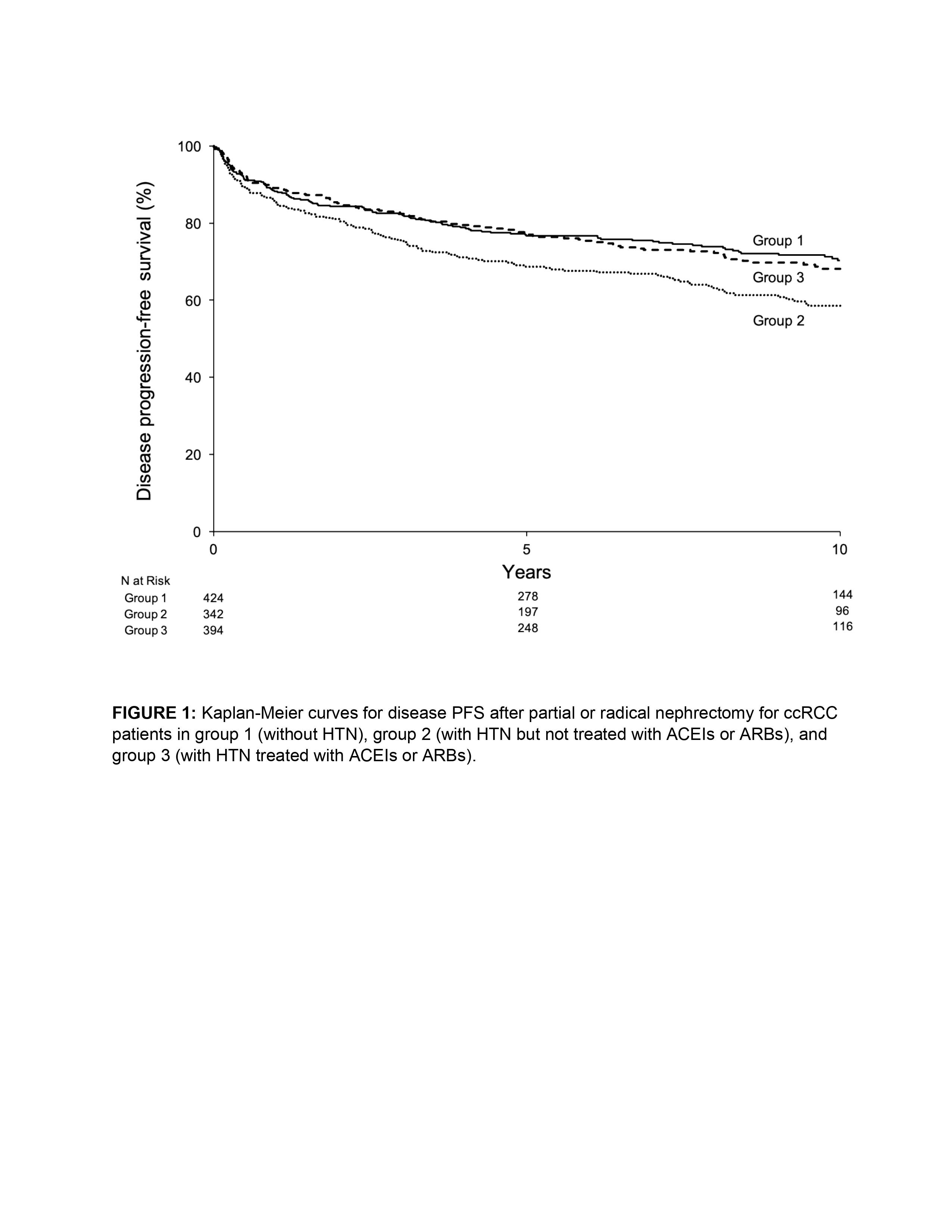Back
Poster, Podium & Video Sessions
Podium
PD33: Kidney Cancer: Localized: Surgical Therapy II
PD33-03: Is Angiotensin System Inhibitor Use Associated with Improved Outcomes in Patients with Localized Clear Cell RCC?
Saturday, May 14, 2022
3:50 PM – 4:00 PM
Location: Room 245
Paige Nichols*, Andrew Zganjar, Christine Lohse, Sounak Gupta, John Cheville, Cameron Britton, Aaron Potretzke, Stephen Boorjian, Houston Thompson, Bradley Leibovich, Vidit Sharma, Rochester, MN
- PN
Podium Presenter(s)
Introduction: Preclinical studies demonstrate VEGF expression is regulated by angiotensin II. Increased angiotensin II receptor expression in clear cell renal cell carcinoma (ccRCC) may be associated with higher tumor grade and poorer survival. It is unknown if angiotensin system inhibitors, in the form of angiotensin-converting enzyme inhibitors (ACEIs) and angiotensin receptor blockers (ARBs), are associated with improved outcomes for hypertensive patients with ccRCC.
Methods: A large nephrectomy registry was queried to identify adults treated with radical or partial nephrectomy for localized ccRCC from 2005-2012. Patients were divided into three groups: (1) patients without HTN, (2) patients with HTN but not treated with ACEIs or ARBs, and (3) patients with HTN treated with ACEIs or ARBs. The primary outcome of disease progression-free survival (PFS) and secondary outcomes of cancer-specific survival and CKD stage PFS were estimated using the Kaplan-Meier method. Associations with disease progression, death from RCC, and CKD stage progression were evaluated using multivariable Cox models. We adjusted for a disease progression score and a death from RCC score in the multivariable models for disease progression and death from RCC, respectively.
Results: Among 1,203 patients, there were 432 (36%), 359 (30%), and 412 (34%) in groups 1, 2, and 3, respectively, with a median follow-up of 10.1 (IQR 7.9-12.5) years. Disease PFS for the three groups is shown in Figure 1. On multivariable analysis, group 3 was associated with improved disease PFS compared to group 2 (HR 0.76, 95% CI 0.57-1.00, p=0.05) but not group 1 (HR 0.89, 95% CI 0.68-1.17, p=0.40). A subset multivariable analysis of group 3 treated with ACEIs alone relative to group 2 demonstrated improved disease PFS (HR 0.68, 95% CI 0.49-0.93, p=0.02). There were no significant differences between groups for either cancer specific survival or CKD stage PFS on multivariable analysis.
Conclusions: The use of ACEIs or ARBs is associated with improved disease PFS in patients with HTN and localized ccRCC after radical or partial nephrectomy. No appreciable differences in cancer specific survival or CKD stage PFS were identified. Further studies are warranted to validate this finding and elucidate underlying mechanisms of angiotensin blockade in ccRCC patients.
Source of Funding: None

Methods: A large nephrectomy registry was queried to identify adults treated with radical or partial nephrectomy for localized ccRCC from 2005-2012. Patients were divided into three groups: (1) patients without HTN, (2) patients with HTN but not treated with ACEIs or ARBs, and (3) patients with HTN treated with ACEIs or ARBs. The primary outcome of disease progression-free survival (PFS) and secondary outcomes of cancer-specific survival and CKD stage PFS were estimated using the Kaplan-Meier method. Associations with disease progression, death from RCC, and CKD stage progression were evaluated using multivariable Cox models. We adjusted for a disease progression score and a death from RCC score in the multivariable models for disease progression and death from RCC, respectively.
Results: Among 1,203 patients, there were 432 (36%), 359 (30%), and 412 (34%) in groups 1, 2, and 3, respectively, with a median follow-up of 10.1 (IQR 7.9-12.5) years. Disease PFS for the three groups is shown in Figure 1. On multivariable analysis, group 3 was associated with improved disease PFS compared to group 2 (HR 0.76, 95% CI 0.57-1.00, p=0.05) but not group 1 (HR 0.89, 95% CI 0.68-1.17, p=0.40). A subset multivariable analysis of group 3 treated with ACEIs alone relative to group 2 demonstrated improved disease PFS (HR 0.68, 95% CI 0.49-0.93, p=0.02). There were no significant differences between groups for either cancer specific survival or CKD stage PFS on multivariable analysis.
Conclusions: The use of ACEIs or ARBs is associated with improved disease PFS in patients with HTN and localized ccRCC after radical or partial nephrectomy. No appreciable differences in cancer specific survival or CKD stage PFS were identified. Further studies are warranted to validate this finding and elucidate underlying mechanisms of angiotensin blockade in ccRCC patients.
Source of Funding: None


.jpg)
.jpg)